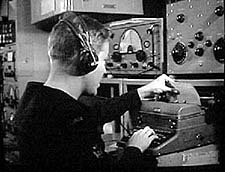 There was a well-founded tradition in the Royal Navy of using Biblical quotations as shorthand for sending messages. The Royal Canadian Navy also used this system.
There was a well-founded tradition in the Royal Navy of using Biblical quotations as shorthand for sending messages. The Royal Canadian Navy also used this system.
Many pithy, witty or just plain snippy words to the wise were relayed via Biblical quotes, which had the virtue of being concise, to the point, and suitable for a range of occasions and eventualities.
References to quotations (i.e. 1 Corinthians 15-33) were used singly or as part of a longer message. Brevity was especially important during wartime. Most signals sent at sea during World War II were conveyed using light or by radio. The sender had to keep messages short, for the sake of efficiency and security.
Even those unfamiliar with scripture were able to use this technique, thanks to a portable digest of Biblical chapter and verse known as a “vade mecum”.
Latin for ‘go with me’, vade mecum refers to a handbook that is carried on the person and consulted as required. Equipped with a copy of this handbook, even people who were not scholars of the Bible could borrow its verses to make a point or deliver a rebuke.

This photo illustrates a portion of the radio room aboard a Canadian Tribal class destroyer of the 1950s. Photo courtesy of HMCS HAIDA.
In any case, some knowledge of the Bible was almost a given during the period when such handbooks were in use. Many schoolchildren received a good grounding in scriptural chapter and verse, whether they received this education at school, Sunday school, home, or all three.
Thus the ship’s Captain, signalmen, or personnel working on the bridge took advantage of Biblical writings to make a few short words go a very long way.
It became almost a craze among senior escort officers in Britain’s Royal Navy to embed Biblical references in their signals. Examples of such exchanges include the following:
From a submarine returning from war patrol to the flotilla Captain:
Psalm 17, verse 4 “Concerning the works of men by the word of thy lips I have kept me from the path of the destroyers”
Reply to signal received by an officer, congratulating him on his promotion:
Psalm 140, 2nd half of verse “They have set gins for me”
Situations when Bible quotes were used were many and varied. These occasions might include:
When a ship collided with the jetty while docking:
Proverbs 22-28 “Remove not the ancient landmark which thy fathers have set”
When a ship was not keeping proper ‘station’, station being the location to which a ship or fleet is assigned for duty:
Psalm 77-19 “Thy way is in the sea and thy path in the great waters and thy footsteps are not known”
Proverbs 4-26 “Ponder the path of thy feet and let all thy ways be established”
To reprimand someone who hadn’t followed instructions properly, or disobeyed them entirely:
Job 31-11 “For this is a heinous crime, yea it is an iniquity to be punished by the judges”
Proverbs 8-33 “Hear instruction and be wise and refuse it not”
To request a report on a particular action or event:
Book of Revelation 1-19 “Write the things which thou hast seen, and the things which are and the things which shall be hereafter”
To give direction:
Deuteronomy 2-3 “Ye have compassed this mountain long enough, turn ye northward”
To chide someone who was overly concerned with promoting his own career or prospects:
Psalm 75-6 “For promotion cometh neither from the east nor from the west nor from the south”
When saying goodbye to another ship:
Acts 21-6 “And when we had taken our leave of one another, we took ship, and they returned home again”
The content of such Biblically-based messages was often light-hearted, but it could also be serious:
In the case of a victory at sea:
Psalm 18-37 “I have pursued mine enemies and overtaken them, neither did I turn again until they were consumed”
By way of a warning against rebellious behaviour by crew members:
Philippians 3-14 “Do all things without murmurings and disputings”
Whether the intention was to praise, rebuke, or simply to entertain and enlighten, the practice of using Biblical quotations for messaging and signalling was a clever way of getting across complex ideas with speed and style.
By Clare Sharpe
museum staff member/webmaster
 CFB Esquimalt Naval and Military Museum
CFB Esquimalt Naval and Military Museum CFB Esquimalt Naval and Military Museum
CFB Esquimalt Naval and Military Museum CFB Esquimalt Naval and Military Museum
CFB Esquimalt Naval and Military Museum CFB Esquimalt Naval and Military Museum
CFB Esquimalt Naval and Military Museum CFB Esquimalt Naval and Military Museum
CFB Esquimalt Naval and Military Museum CFB Esquimalt Naval and Military Museum
CFB Esquimalt Naval and Military Museum CFB Esquimalt Naval and Military Museum
CFB Esquimalt Naval and Military Museum CFB Esquimalt Naval and Military Museum
CFB Esquimalt Naval and Military Museum CFB Esquimalt Naval and Military Museum
CFB Esquimalt Naval and Military Museum CFB Esquimalt Naval and Military Museum
CFB Esquimalt Naval and Military Museum CFB Esquimalt Naval and Military Museum
CFB Esquimalt Naval and Military Museum CFB Esquimalt Naval and Military Museum
CFB Esquimalt Naval and Military Museum CFB Esquimalt Naval and Military Museum
CFB Esquimalt Naval and Military Museum CFB Esquimalt Naval and Military Museum
CFB Esquimalt Naval and Military Museum CFB Esquimalt Naval and Military Museum
CFB Esquimalt Naval and Military Museum CFB Esquimalt Naval and Military Museum
CFB Esquimalt Naval and Military Museum CFB Esquimalt Naval and Military Museum
CFB Esquimalt Naval and Military Museum